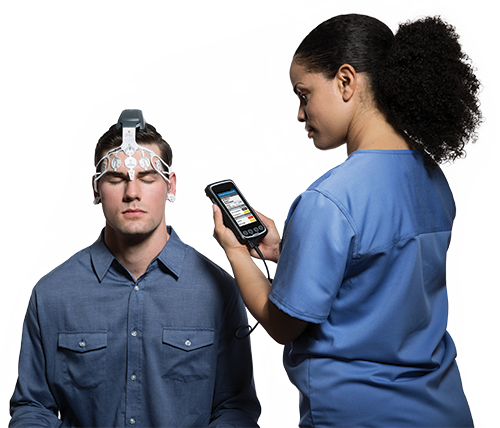Workplace Concussion: Introducing BrainScope

June 21, 2021 by Keely Knopp
From the June Mercy Occupational Medicine eNewsletter
A head injury can be one of the most dangerous and costly on-the-job accidents employees and their employers face. Concussions and other traumatic brain injuries need prompt diagnosis and treatment, making it incredibly important to receive medical attention for all head injuries, even when the individual seems OK.
Fortunately, Mercy Urgent Care is equipped to help quickly and efficiently diagnose concussions and other brain injuries using BrainScope® technology, an innovative new medical device that helps assess and identify a wide spectrum of brain injuries, from concussions to structural injuries and injuries to brain function. Available at our West Asheville and Weaverville urgent care clinics, BrainScope assessments are fast, accurate and accessible — taking usually only about an hour — saving precious time and money over a lengthy ER visit.
But time isn’t the only thing it helps save. In terms of insurance and workers’ compensation claims, the financial impact of a brain injury can sometimes be felt for years after the initial incident — especially without proper diagnosis and treatment. The sooner an employee with a potential concussion can be examined and treated, the lower the risk of long-term damage.
Brain injuries are not limited to concussions alone. Other types of brain injuries include contusions, in which the brain is literally bruised; a penetrating head wound such as skull fracture; or an anoxic brain injury, where the brain is deprived of oxygen. Concussions, however, remain the most common form of brain injury in the workplace.
Often referred to as “invisible” injuries, concussions do not always result in obvious physical problems. Understanding the symptoms that indicate a concussive brain injury is vital to effective treatment. The sooner an employee with a potential concussion can be examined and treated, the lower the risk of long-term damage.
So, who is susceptible?
Employees working in industries like construction or manufacturing may appear more likely to be exposed to a potential brain injury. However, any employee in any kind of work environment can be susceptible. For example, loose carpeting, a spill in the breakroom, or a rain-soaked staircase could all be potential fall hazards resulting in possible concussion or brain injury.
What should you do if a head injury occurs?
Since a concussion may not be a visible injury, an employee who has sustained any form of head injury should be immediately checked for a possible concussion. They should be taken to an urgent care or emergency room for diagnosis, and then referred to a specialist or neurologist for further treatment, if necessary.
It is important to note that concussion diagnoses can be somewhat subjective. Physicians and providers typically look for certain key symptoms that indicate the possibility of brain injury. Common medical wisdom is to err on the side of caution, since even “mild” concussions can have serious, debilitating effects. The BrainScope technology available at Mercy Urgent Care can save trips to the ER, prevent the need for expensive CT scans, and save the patient from unnecessary radiation exposure.
What can employers do to prevent possible brain injuries?
Below are some tips for creating a safer work environment. Implementing these changes and sharing these suggestions with employees can help prevent potential head injuries.
- Remove tripping hazards. Keep walkways and workspaces free of clutter, cords, water, or anything that could cause a slip, trip, or fall.
- Use proper signage to alert employees of wet surfaces.
- Use handrails when climbing or descending stairs.
- Avoid standing on chairs, desks, or tables. Use a ladder or step-stool instead.
- Use caution when working from heights. Never stand on the top two steps of a ladder.
- If a job requires wearing a helmet, make sure it fits properly and is in good condition.
- Make sure all vehicles, either warehouse or on-road, are well-maintained and fully operational.
- Keep heavy or bulky objects stored on lower shelving racks, and avoid maneuvering heavy items above your head.
Remember that brain injuries can be very costly to employers and employees alike. According to the Brain Injury Law Center, the total cost of a serious brain injury can exceed six figures in the first year. Recovering from a serious injury can include speech, occupational, and physical therapy — and treatment can take months, or even years. Treating a severe brain injury can include lengthy hospital stays, extensive rehabilitation and medication costs, occupational retraining, and even assistance from a personal caregiver or nurse.
Concussion assessment with BrainScope
A head injury assessment using the innovative new BrainScope device at Mercy Urgent Care is fast, patient-friendly, accurate, and comprehensive. BrainScope is able to provide objective data on concussion, structural brain injury, and brain function. Whereas most offices use only subjective data, Mercy Urgent Care can provide a more comprehensive evaluation and follow-up to concussive brain injuries. The BrainScope system can even be used to establish a baseline for your employees, which can be helpful in the event of any future injuries that may occur.
Learn more about BrainScope here.
Ask how Mercy Urgent Care can help your organization better manage brain injury protocols

